|

Genre
isn’t really important for this Canadian record producer who prefer to
work on music that has a strong identity and shows elements of
originality. So he has done lots of different styles of music in
studios all over the world for diverse artists such as Peter Gabriel,
King Crimson, Muse, Kid Rock, Stone Sour, and of course Tool on Ænima,
Salival and Lateralus.
Salival:
First, can you tell how you
started your career?
David Bottrill: I started in 1983 at Grant Avenue Studios in Hamilton,
Canada. It was
owned by Bob and Daniel Lanois. We had mutual friends and I obtained an
interview. We agreed I would intern until a job became available, which
it did in about 6 months. When Dan went to England to work with Peter
Gabriel, he took me with him to assist on the sessions. When we
finished that record, I stayed working with Peter for the next 9 years.
And
one day, the Tool guys sent you some of their music. As
this was more direct and you weren't familiar with that kind of music
then, what made you decide to meet them anyway?
At first, I thought they had me confused with someone else, but when I
heard their music I thought they were a great band. They had been
inspired by some of the work I had done, and they thought we would be a
good
working match as they wanted to do something a bit more unique than a
standard Los Angeles metal record.
What
did you think when you first met them?
They ran me through a
rehearsal. I loved both their new music which was to become Ænima
and their strong work ethic.
Did the
combination work from the start?
We got along right away and had very few conflicts while working
together. It was a great experience. As with every relationship,
there's a building of confidence and communication, but that happened
quite quickly and we began the recording soon after that.
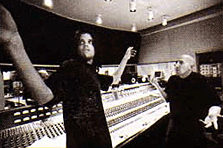 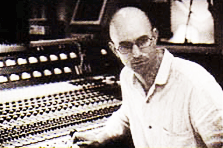
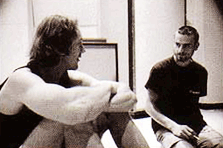
Did they really work
everything out before getting into the
studio?
I know they rehearsed and wrote for a long time before going into the
studio, and most things were crafted before. When
it came time for each musician to do their parts, they were prepared
and came to work promptly and ready to play. That's not the case with a
lot of bands.
I've
read that for the recording of Danny Carey's part, he
chose carefully the different elements he used with each song, and
disposed them following certain mathematical precepts, etc. Was it a
hard job for you?
I don't know what you read, but though he may have some of that in his
mind, we recorded the drums and electronics in the usual fashion.
And
can you speak about Justin Chancellor's beginnings, as he was new in
the band?
Justin, though he was first a fan of the band, is a talented and
creative musician in his own right. From very early on, he was
contributing to the compositions.
About
Maynard James Keenan, his lyrics are as meaningful as
Tool's music is powerful. Did you discuss with him of his writings?
Maynard would
tell me his concepts and his lyrics, and together we would record the
vocals in a way as to realize his vision.
Five
years after that, you came back with Tool for Lateralus. Have
you been quickly aware they were about to go one step further with this
opus?
Yes. When I heard the songs for the first time, I knew they were
creating something special, more than just an album of songs.
Before
Lateralus,
Maynard also asked you to work on the first album of A Perfect
Circle, but it didn't happen. Do you remember Billy
Howerdel's project as he started to worked on it during the production
of Ænima?
Yes.
He's a very creative musician. He was working on a few projects at that
time, and one of them finally became A Perfect Circle.
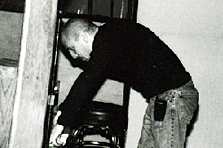 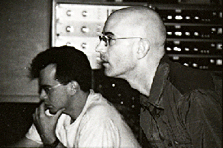
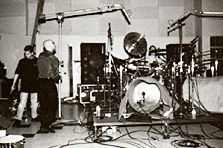
It wasn't the same budget
for Lateralus, and there was more time for it. What did that
change compared to the previous album?
We worked much in the same way. The money was not an issue.
How
did the pressures from all the litigations they knew at the time affect
the recording?
It put a bit of a strain on the band, but as many would have given up,
Tool seemed to come out of those troubles stronger.
Do you
remember suggestions you made, accepted or not?
On Lateralus,
I helped more with the structure of some of the songs. I remember
campaigning to lose a section of the song "Lateralus" that Danny liked
a lot. I think he still is a little sorry it didn't' make it into the
song.
Lateralus
is a very complex album. Did any elements block the process, and did
you have to drop some of them?
Actually, Lateralus was in some ways easier to record than Ænima.
The lines of communication were open already between myself and the
band, and it was generally a smooth process.
And are
all references and artworks
surrounding Tool something that appeals to you?
Generally, yes. Adam works very hard on the visual representation of
Tool.
Both Ænima
and Lateralus are considered as
the best albums Tool made, and are still at the pantheon of heavy
music. Did you anticipate how they were going to be received? And
how do you consider them with hindsight?
I had no idea, but they are two of the
projects I've done that I'm most proud of.
|